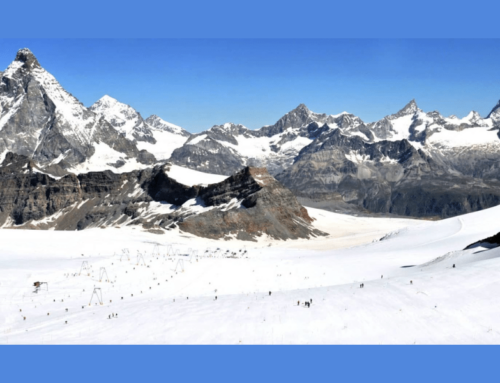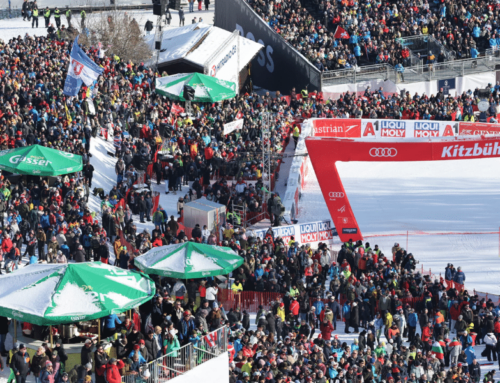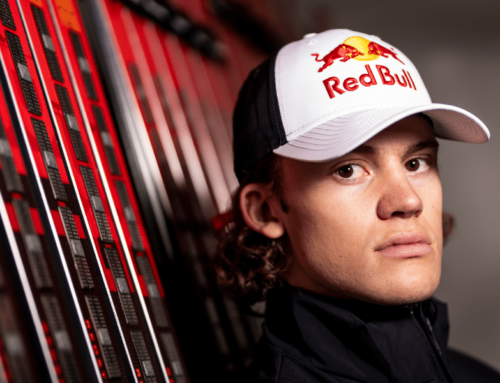Daniel Yule, a multi-faceted role model
Growing up, Daniel Yule had no intention of becoming a World Cup ski racer. In fact, his dream was to be a footballer, specifically Manchester United’s then-superstar, David Beckham. As a kid growing up in La Fouly, Switzerland, in the summer he played soccer, and in the winter, he ski raced. That’s just the way things worked. Ski racing was not necessarily the “cool” thing to do; it was just about one of the only things to do. And since all of his school friends were in the ski club, Yule thought he should join the ski club too. He realized pretty quickly that he was “less bad” at ski racing than he was at soccer, and so when the time came to concentrate on one sport or the other, Yule chose to focus on the sport where long-term success was more likely.
“Even as a kid, I was never this wonder kid, the next Didier Cuche, or whoever it might be. I was always sort of the ‘Ya, he can ski down slopes, but he’s never going to make it in the World Cup or whatever’ kind of kid,” he laughs.
Fortunately for the Swiss ski team, Yule stuck with ski racing. So far in the 2019-20 season, Yule has made history more than once. After an inspiring streak of racing in January, a block of the World Cup tour notoriously recognized as one of the most challenging, Yule has earned the honors of becoming the winningest Swiss slalom skier of all time. He championed Madonna di Campiglio for the second time, as well as Kitzbuehel, and most importantly, Adelboden – where he became the first Swiss to win on home soil since 2007. That day will go down in Yule’s mind as one of the most spectacular wins of his ski racing career.

Historically, the Swiss slalom team has never amounted to much as a whole. Sure, there have a few guys here and there that have had some slalom success, but none have been quite as strong of a force as the current crew of Swiss slalom skiers. Switzerland as a nation is better known for its talent on the men’s speed circuit, with the likes of Beat Feuz and Mauro Caviezel currently leading the charge.
“There’s always been great slalom skiers in general, but then for some reason there was this call to the speed disciplines. If you look at Daniel Albrecht or even a Beat Feuz, they were all great slalom skiers but then they just very quickly transitioned to the speed side of things, whereas so far none of us have done that,” says Yule. “We’ve been able to just keep this team dynamic going and now we are fighting for podiums.”
Yule, Ramon Zenhauesern, Justin Murisier, and Luca Aerni, all grew up in the Valais region of Switzerland and raced within the ’92 and ’93 age groups. Of the men who have scored slalom points so far in 2019-20, Marc Rohat, Reto Schmidiger, and Sandro Simonet, also competed in the same years. Loic Meillard and Tanguy Nef are not far off in age, just a few years younger than the majority of the group. The widespread success of the team has sparked what some media have dubbed: the “Swiss Slalom Movement.”
“Even when we’re playing Spikeball or whatever in the afternoon, everybody knows if we’re playing, we are playing to win.”
Daniel yule
The crew has been racing with and against each other over the past 10 to 15 years, which has created a dynamic that allows for their competitive spirit to thrive on the hill, and brotherhood to take its place off the hill. At the time the men were rising through the ranks as boys, the Swiss didn’t have a slalom team, giving them the opportunity to step up and end the slalom dry spell for their nation on the World Cup circuit. When Yule was named to the team, he only had a couple of top 15 finishes in the Europa Cup under his belt. Now, he says, a guy with similar stature at his age has no chance of making the slalom team. He and his teammates saw the space and are occupying it in full.
“We are extremely open about the fact that we’re competitive. It’s not backstabbing or this or that,” expresses Yule. “All the guys know that come Sunday in Kitzbuehel, I want to beat them and I know that they want to beat me, just for bragging rights. Even when we’re playing Spikeball or whatever in the afternoon, everybody knows if we’re playing we are playing to win. We’re all grownups and on the slopes. We know it’s every man for himself. And then we can just put that to one side and stay good friends off the slopes.”
On the day of Yule’s historic win, the Swiss slalom team came out fighting. Going into the second run, four guys sat in the top five, and Yule was leading the pack. As he shuffled into the start gate, he could hear the crowd roaring below. He’d watched his teammates compete ahead of him, and fail to find podium-worthy times. In his final moments in the start house, as he prepared to launch himself down the pitch, Yule knew if the day was going to end in a Swiss win it was all on him.
“I remember thinking in the start gate, ‘Okay Daniel, if it’s going to be a Swiss win today it’s up to you, so you better do it.’ As a Swiss racer in Switzerland, I knew crossing the finish line, if it’s green, I’ve won.”
And win he did. Yule skied into a thunderous explosion of cheers and pride from the surrounding Swiss crowd, a sound he compared to the deafening roar once associated with a Marcel Hirscher win in Schladming — but better. Captured in the NBC highlight below, he pounded his chest yelling, ‘This is my house,’ before graciously hugging his competitor and second-place finisher Henrik Kristoffersen.
The pressure to succeed was omnipresent. But under pressure is where Yule thrives. He’s never been one to settle, a character attribute he claims allowed him to see past the naysayers when he was a teen and rise up to the level he competes at today, as the leader of the Swiss slalom movement.
“Even now, the trainer I have on the World Cup says the first time he saw me ski, he said ‘Oh yeah, he’s a good skier but there’s no way he’s ever going to make it on the World Cup’ and six or seven years later, here we are,” Yule explains jokingly. “I’m somebody who’s really competitive, pretty stubborn, I think that’s what’s got me to where I am now. I’ve grown up and maybe mellowed a little but that’s what I enjoy about skiing. I don’t want to say I get fed up with training, but I’m often really happy to see the first race come around because that’s what I like to do.”
Yule’s personal competitive nature and stubbornness, in addition to that of his teammates, has driven him to great heights. Not just in the pursuit of ski racing, but in pursuit of being a holistic, well-rounded human being.
As Yule rose through the ranks on the World Cup circuit, the 27-year-old was studying university-level economics and business on the side. Yule is also a lover of language. He currently speaks English, French, German, Italian, and is slowly working his way up to proficiency in Spanish, although he does not yet credit himself with being fluent in five languages.
His parents, Andrew and Anita, were both school teachers and always pushed him to be academically inclined, even with a heavy ski racing schedule. His mother is of Scottish heritage, and his father is of British, and while both parents love skiing, they were never actively involved in the ski racing community. Yule, his older brother Alastair, and his younger sister Verbier, were raised to be curious global citizens and to take action when action is needed.
“If you want something, you probably need to go out and get it.”
Daniel yule
Becoming a lawyer, another childhood dream, was no longer an option once his ski racing career took off. As a rational thinker, Yule assumed business would be the next best thing, something that could assist him in his ski racing career and beyond once the dust had settled. If racing did not turn out to be a lucrative pathway, his eggs would not all be in one basket. To keep things interesting, Yule recently chose to act as his own manager, dealing with the business side of his profession in addition to the athletics. That includes all of the planning, sponsorships, and logistics most professional athletes typically have taken care of for them.
“When you have a manager, you kind of just sit back and wait for things to come to you,” says Yule. “I don’t really believe in that philosophy. If you want something you probably need to go out and get it.”
“Also, I think it’s kind of fun. It’s always very interesting to see what’s going on behind the scenes and I find myself in so many situations where I’m meeting interesting people,” he adds.
Not only is Yule his own manager, but he’s also been elected by his competitor’s as a FIS athlete representative alongside the now-retired Italian Verena Stuffer. And while he says in the middle of the season he has “other fish to fry,” such as competing for the slalom crystal globe, his responsibilities are not ones he takes lightly.

Yule has consistently been vocal when he sees something happening in the sport he does not agree with. For example in 2019, he donated half of his remaining prize money from podiums in Kranjska Gora and Soldeu to Protect Our Winters Switzerland, on the heels of the controversy stirred when FIS President Gian Franco Kasper expressed his disbelief in climate change.
“I’ve been somebody whose been critical of things in the past, and the thinking behind putting my name into the hat to be an athlete rep is, it’s all good and well to criticize things, but if you want to make a change you probably need to be actively involved and not just say ‘This is rubbish, I’d do it some other way,'” explains Yule. “I figured if I do want to make a change, being an athlete rep is good place to start.”
And when it comes to speaking out for issues he cares about, Yule is not a one-hit wonder. He has been outspoken in his distaste for the current parallel giant slalom format, one he believes is both unfair and unsafe for the athletes that elect to compete in the discipline. He also continues to actively highlight the fight for a better planet in contrast to his racing career. Come Sunday, he will be competing in the slalom races in Japan. To offset his guilty conscience, and the carbon emissions generated from a long international flight, Yule opted to donate a couple of thousand Francs to Climeworks, a Zurich-based company that utilizes a carbon dioxide removal method from ambient air.
“The CO2 filtered from the air is then stored underground as a stone. This means that my flight’s CO2 consumption can be permanently and safely removed from the atmosphere,” he told Blick, a Swiss media outlet.

Being from a small town he describes as an idyllic Swiss postcard, Yule can’t help but feel one with nature. In contrast to his drive and unrelentingly competitiveness, Yule enjoys the quiet, slow-pace of life in a “back valley” of Switzerland. His hometown and myriad of hobbies and interests have helped keep him grounded in the face of impending ski racing stardom as he continues to push himself farther in the sport.
“I just like to have a source of something going around in my head and not be so focused on the skiing,” explains Yule. “It helps take the pressure off of the skiing. Maybe now less so, because I’ve had some success and I feel much more confident as a person in general about what I can do and what I can’t.”
“With my parents pushing the academic side of things, I think that helped me treat skiing as a hobby and to not put pressure on myself. Obviously, me being me I always wanted to do well, but it was always – I could sort of have this feeling of ‘Oh if skiing doesn’t work out, you’ll be fine. You can do other things,'” he said.
When the World Cup tour concludes in March, Yule plans to retreat to his hometown of La Fouly, play some golf, maybe travel, move into his first apartment, and finally, decompress. Although he has yet to fully absorb and properly celebrate his historic season, he’s had enough pause to recognize the “irony” of his success.
“The first Swiss one to do ‘it’ is actually a British guy,” he laughs. “I was born and raised in Switzerland. The British have never done anything for my skiing career, so I feel 100% like a Swiss skier. I just find it kind of funny.”





















